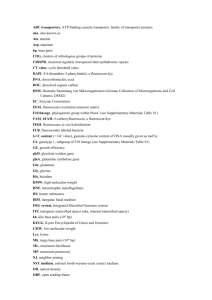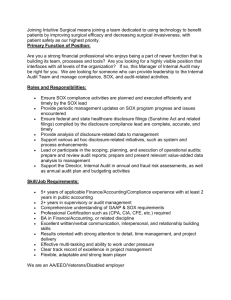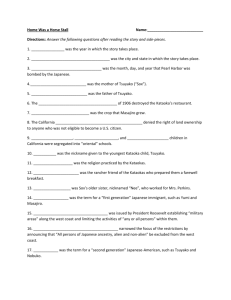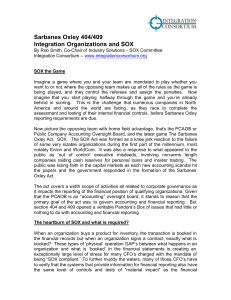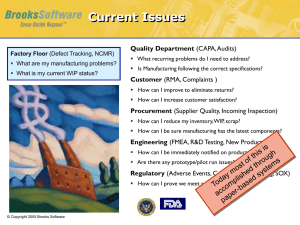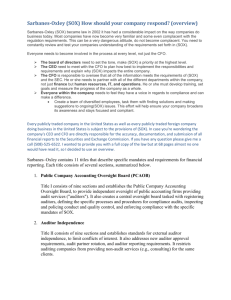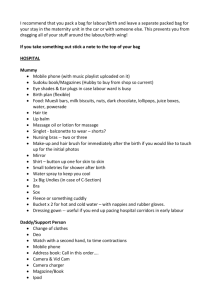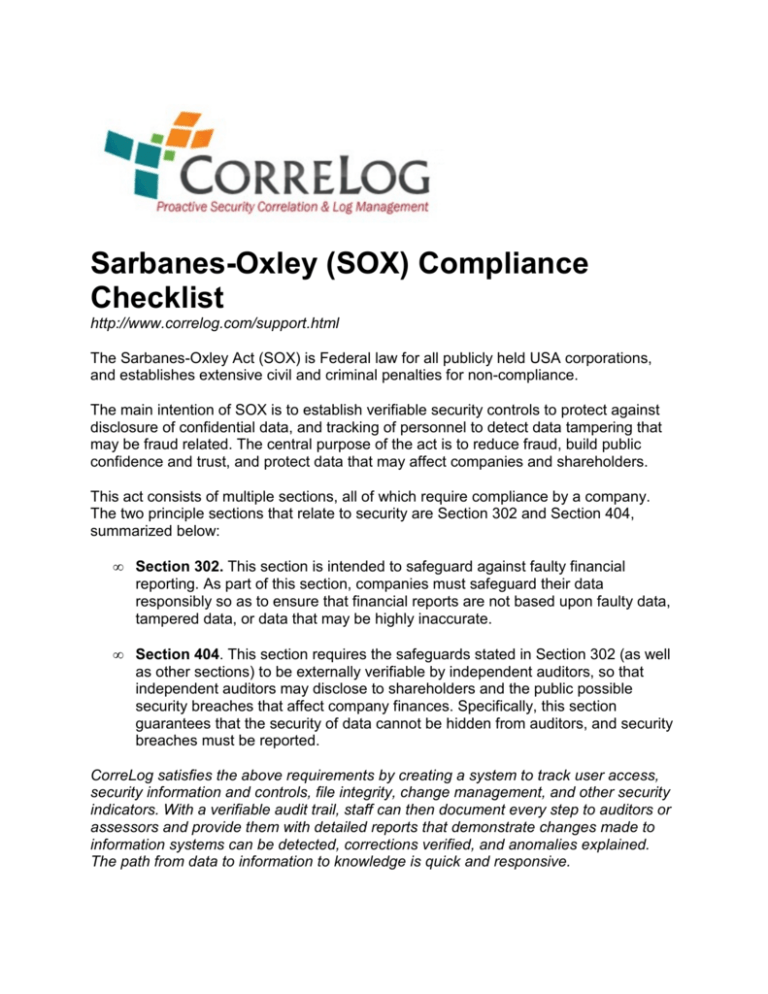
Sarbanes-Oxley (SOX) Compliance
Checklist
http://www.correlog.com/support.html
The Sarbanes-Oxley Act (SOX) is Federal law for all publicly held USA corporations,
and establishes extensive civil and criminal penalties for non-compliance.
The main intention of SOX is to establish verifiable security controls to protect against
disclosure of confidential data, and tracking of personnel to detect data tampering that
may be fraud related. The central purpose of the act is to reduce fraud, build public
confidence and trust, and protect data that may affect companies and shareholders.
This act consists of multiple sections, all of which require compliance by a company.
The two principle sections that relate to security are Section 302 and Section 404,
summarized below:
•
Section 302. This section is intended to safeguard against faulty financial
reporting. As part of this section, companies must safeguard their data
responsibly so as to ensure that financial reports are not based upon faulty data,
tampered data, or data that may be highly inaccurate.
•
Section 404. This section requires the safeguards stated in Section 302 (as well
as other sections) to be externally verifiable by independent auditors, so that
independent auditors may disclose to shareholders and the public possible
security breaches that affect company finances. Specifically, this section
guarantees that the security of data cannot be hidden from auditors, and security
breaches must be reported.
CorreLog satisfies the above requirements by creating a system to track user access,
security information and controls, file integrity, change management, and other security
indicators. With a verifiable audit trail, staff can then document every step to auditors or
assessors and provide them with detailed reports that demonstrate changes made to
information systems can be detected, corrections verified, and anomalies explained.
The path from data to information to knowledge is quick and responsive.
Each pertinent subsection of these two main sections of SOX is discussed in detail
within the paragraphs that follow. (Actual sections of SOX are available from a variety of
sources, and are paraphrased below in the context of security frameworks. See
Appendices for specific references.)
Section 302.2 – Establish safeguards to prevent data tampering.
Explanation. This section of SOX requires that the signing officer must attest to the
validity of reported information. Safeguards must exist to prevent tampering with data,
so that data is verifiably true.
CorreLog tracks user access to all the computers that contain your sensitive data. It
detects logins to those computer systems processing financial data, and protects this
data in a variety of ways: it ensures that the system is performing as expected (with
regard to performance, access and software updates) and it detects break-in attempts
to computers, databases, websites and storage disks. CorreLog monitors disk activities,
disk mount points and use of removable storage including CD/DVD burners and
removable USB storage devices.
Section 302.3 – Establish safeguards to establish timelines.
Explanation: This section of SOX requires that the signing officer attest to the fact that
reported information is fairly presented, including accurate reporting for the time
periods. Safeguards must exist that the data relates to a verifiable time period.
CorreLog timestamps all data as it is received. As a real-time system, the data is
immediately stored at a remote location as it is generated, preventing alteration or loss
of this data by any action that can occur at the managed node. Additionally, this log
information is compressed, moved to a new location (i.e. a secure archive), and a
checksum is created. The MD5 checksum is encrypted, preventing any tampering with
the file or checksum. This completely secures audit trails so they cannot be altered.
Section 302.4.B – Establish verifiable controls to track data access.
Explanation: This section of SOX requires internal controls over data, so that officers
are aware of all relevant data. Data must exist in an internally controlled and verifiably
secure framework.
CorreLog can process more than 2000 messages per second and can handle burst
traffic of more than 10,000 messages in one second (depending upon the supporting
hardware.) In a two-tier architecture, CorreLog can receive messages from virtually
unlimited numbers of sources. Additionally, CorreLog is a highly extensible system that
permits collection of data through file queues, FTP transfers, and databases,
independent of the actual framework (such as COBIT and ISO 27000 standards.)
CorreLog, Inc.
Page 2
SOX Compliance Checklist
Section 302.4.C – Ensure that safeguards are operational.
Explanation: This section of SOX requires that officers have evaluated the effectiveness
of the internal controls as of a date within 90 days prior to the report. The security
framework must be periodically reviewed and verified.
CorreLog is a robust background process, which operates continuously on your
network. Because it is a web based program, it is available from an unlimited number of
seats, and its operation can be checked and reviewed by any individual with a remote
login to the system. Additionally, CorreLog provides a suite of facilities that can issue
daily reports to e-mail addresses or distribute reports via RSS, making it easy to verify
that the system is up and running. CorreLog provides clear indications of its startup
times, shutdown times, as well as these times for all managed devices.
Section 302.4.D – Periodically report the effectiveness of safeguards.
Explanation: This section of SOX requires officers to generate a report on the
effectiveness of the security system, and state their conclusions. The security
framework should report its effectiveness to auditors and officers of the enterprise.
CorreLog is easy to use, and requires minimal training. CorreLog generates multiple
types of reports, including a report on all messages, critical messages, and selfgenerated alerts. Reports can be automatically distributed via e-mail and RSS, and are
provided in Excel format (as well as other formats) to make the job of the auditor easy.
Additionally, CorreLog archives reports for later review and forensics, so that auditors
can see a clear indication of operation and the types of data being tracked, and easily
draw their conclusions. Finally, CorreLog incorporates a ticketing system that illustrates
what kind of security problems and activities have taken place recently, or in the distant
past.
Section 302.5.A&B – Detect Security Breaches
Explanation: These two subsections of SOX are similar to those found in Section 404
A&B, and require that security breaches (either due to flaws in the control system, the
security system, or due to fraud) be detected.
CorreLog uses an advanced correlation engine, which performs semantic analysis of
messages in real-time. The system employs correlation threads, correlation counters,
correlation alerts, and correlation triggers, which refine and reduce incoming messages
into high-level alerts. These alert open tickets, which document the security breach, and
which can also trigger actions such as sending e-mail, or updating an incident
management system. The result is a reduction of large amounts of logged data into
real-time security alerts that are sent directly to security personnel and auditors.
CorreLog, Inc.
Page 3
SOX Compliance Checklist
Section 404.A.1.1 – Disclose security safeguards to independent auditors.
Explanation: This section of SOX relates to management appointed auditors, and
requires them to review control structures and procedures for financial reporting. The
existence of a security framework, and parties responsible for the operation of the
security framework, must be disclosed to auditors.
CorreLog provides access and security to auditors using role-based permissions. For
example, auditors may be permitted complete access to specific reports and facilities
without the ability to actually make changes to these components, or reconfigure the
system. Additionally, because CorreLog is a secure and web-based application,
auditors do not have to be physically present to assess security aspects, or any
particular operation of the system. All aspects, including the downloading of reports, can
be performed remotely (given proper authentication of the user.)
Section 404.A.2 – Disclose security breaches to independent auditors.
Explanation: This section of SOX requires auditors to assess the effectiveness of the
internal control structure. The general effectiveness of the security framework must be
measured and disclosed.
CorreLog is designed to be a complete security logging solution, capable of detecting
security breaches, notifying security personnel in real time, and permitting resolution to
security incidents to be manually entered and stored. In particular, the stream of input
messages is continuously correlated to create tickets (which record security breaches
and other events.) The CorreLog ticketing system includes an e-mail interface that can
quickly notify both auditors and security officers of compromised files, security
breaches, and other significant events. Tickets can be summarized in reports to allow
easy assessment and disclosure of recent and past security breaches.
Section 404.B – Disclose failures of security safeguards to independent auditors.
Explanation: This section of SOX requires auditors to be aware of (and report on)
significant changes to internal controls, and significant failures that could significantly
affect internal controls. Verification must exist that the security framework has been both
operational and effective.
CorreLog schedules periodic tests of network and file integrity, and verifies that certain
messages are logged, indicating successful tests. CorreLog interfaces easily with
common, security-test software, including port scanners, to verify that CorreLog is
successfully monitoring system security. CorreLog provides numerous self-monitoring
functions that can trigger alarms and real-time e-mail messages to multiple individuals
responsible for both maintaining the system, and auditing its performance. This provides
a clear indication of operation and security coverage needed to satisfy this particular
requirement.
CorreLog, Inc.
Page 4
SOX Compliance Checklist
COBIT and ISO 27000 Support
Sarbanes-Oxley makes multiple references to "internal control" of data. To meet this
requirement, companies must establish rules and guidelines by which the organization
is controlled and audited.
There are many acceptable techniques for establishing this type of governance; one of
the most popular methods of establishing "internal control" is to implement the "COBIT
Framework", created by ISACA. COBIT is an extensive set of guidelines and tools that
describe processes and organizational requirements needed to promote security and
create good governance capable of satisfying SOX requirements. The framework
consists of its own standards, as well as many other standards, including ISO/IEC
27000.
CorreLog supports the COBIT framework and ISO/IEC 27000 in various ways. The
ISO/IEC 27000 standard directly relates to information security, and CorreLog satisfies
these important requirements by implementing verifiable security controls and
safeguards on your computer network as follows:
•
CorreLog monitors file integrity and file structures on information systems,
including hardware, software, network, and security infrastructure. It then
provides detailed change audit information to enable agency staff to quickly
pinpoint, analyze, and recover from any undesirable change. CorreLog delivers
assurance that authorized changes are completed, and that unauthorized or ad
hoc changes that circumvented policy are detected and immediately reported.
•
With a verifiable audit trail, staff can then document every step to auditors or
assessors and provide them with detailed reports that demonstrate changes
made to information systems can be detected, corrections verified, and
anomalies explained. The path from data to information to knowledge is quick
and responsive.
•
By implementing change detection and reporting with configuration assessment,
CorreLog assesses every change as authorized, within policy and compliant,
ensuring systems achieve a known and trusted state. CorreLog then helps
maintain that known and trusted state by establishing a secure baseline to
measure change against, and then monitors against that baseline through
ongoing, tunable change detection and reporting.
An organization cannot claim to have a comprehensive information security policy, or
meet COBIT framework objectives, without monitoring the security message being
constantly logged on platforms within your enterprise. An enterprise that installs
CorreLog, with no other action, takes a major step forward in creating and maintaining
an enterprise security policy that satisfies ISO/IEC 27000, COBIT objectives, and the
legal obligations of Sarbanes-Oxley.
CorreLog, Inc.
Page 5
SOX Compliance Checklist
Appendix: Sarbanes-Oxley Section 302
SEC. 302. CORPORATE RESPONSIBILITY FOR FINANCIAL REPORTS.
(a) REGULATIONS REQUIRED. — The Commission shall, by rule, require, for each
company filing periodic reports under section 13(a) or 15(d) of the Securities Exchange
Act of 1934 (15 U.S.C. 78m, 78o(d)), that the principal executive officer or officers and
the principal financial officer of officers, or persons performing similar functions, certify
in each annual or quarterly report filed or submitted under either such section of such
Act that —
(1) the signing officer has reviewed the report;
(2) based on the officer's knowledge, the report does not contain any untrue statement
of a material fact or omit to state a material fact necessary in order to make the
statements made, in light of the circumstances under which such statements were
made, not misleading;
(3) based on such officer's knowledge, the financial statements, and other financial
information included in the report, fairly present in all material respects the financial
condition and results of operations of the issuer as of, and for, the periods presented in
the report;
(4) the signing officers:
(A) are responsible for establishing and maintaining internal controls;
(B) have designed such internal controls to ensure that material information relating
to the issuer and its consolidated subsidiaries is made known to such officers by
others within those entities, particularly during the period in which the periodic
reports are being prepared;
(C) have evaluated the effectiveness of the issuer's internal controls as of a
date within 90 days prior to the report; and
(D) have presented in the report their conclusions about the effectiveness of
their internal controls based on their evaluation as of that date;
(5) the signing officers have disclosed to the issuer's auditors and the audit committee
of the board of directors (or persons fulfilling the equivalent function) —
(A) all significant deficiencies in the design or operation of internal controls
which could adversely affect the issuer's ability to record, process, summarize,
and report financial data and have identified for the issuer's auditors any material
weaknesses in internal controls; and
(B) any fraud, whether or not material, that involves management or other
employees who have a significant role in the issuer's internal controls; and
(6) the signing officers have indicated in the report whether or not there were significant
changes in internal controls or in other factors that could significantly affect internal
controls subsequent to the date of their evaluation, including any corrective actions with
regard to significant deficiencies and material weaknesses.
CorreLog, Inc.
Page 6
SOX Compliance Checklist
Appendix: Sarbanes-Oxley Section 404
SEC. 404. MANAGEMENT ASSESSMENT OF INTERNAL CONTROLS.
(a) RULES REQUIRED. — The Commission shall prescribe rules requiring
each annual report required by section 13(a) or 15(d) of the Securities
Exchange Act of 1934 (15 U.S.C. 78m or 78o(d)) to contain an internal
control report, which shall —
(1) state the responsibility of management for establishing and maintaining an
adequate internal control structure and procedures for financial reporting;
and
(2) contain an assessment, as of the end of the most recent fiscal year of the
issuer, of the effectiveness of the internal control structure and procedures
of the issuer for financial reporting.
(b) INTERNAL CONTROL EVALUATION AND REPORTING. — With respect
to the internal control assessment required by subsection (a), each
registered public accounting firm that prepares or issues the audit report
for the issuer shall attest to, and report on, the assessment made by the
management of the issuer. An attestation made under this subsection
shall be made in accordance with standards for attestation engagements
issued or adopted by the Board. Any such attestation shall not be the
subject of a separate engagement.
CorreLog, Inc.
Page 7
SOX Compliance Checklist
Appendix: References and External URLS
http://www.sec.gov/rules/proposed/s74002/card941503.pdf
A white paper, hosted by the USA Security and Exchange Commission (SEC),
proposing practical, cost effective compliance strategies. According to the
preface: Traditional audit/compliance approaches and tools in use in most
companies today are woefully inadequate to meet the virtually "real time"
assessment and monitoring expectations imposed by sections 302 and 404, and
an automated SIEM system (such as CorreLog) is required.
http://www.correlog.com/solutions-and-services/sas-compliance-sox.html
An introductory discussion of SOX compliance requirements, hosted by
CorreLog, Inc. SOX regulations serve a somewhat different purpose from various
other standards and guidelines. Unlike most security compliance measures, SOX
is intended to create traceable data to prove (or disprove) corporate fraud and
malfeasance in accounting and administration. In practice, the mechanics of
implementing SOX compliance are almost identical to that of implementing a
corporate security process, as described here.
http://www.correlog.com/solutions-and-services/index-compliance.html
An overview of CorreLog compliance features. In addition to SOX compliance,
CorreLog provides auditing and analysis services for organizations concerned
with meeting SIEM requirements stated by PCI/DSS, NERC, HIPAA, SOX,
FISMA, GLBA, NCUA, and others. Proactively manage your system security, and
achieve regulatory compliance. Our solutions install quickly, and with no
surprises
CorreLog, Inc.
Copyright © 2011. All rights reserved.
http://www.correlog.com
mailto:sales@correlog.com
CorreLog, Inc.
Page 8
SOX Compliance Checklist

